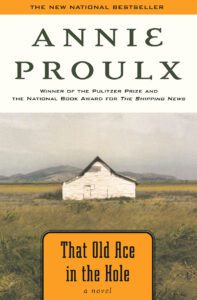
Author: Annie Proulx
Publication Year: 2002
Length: 384 pgs
There are surprisingly few grisly deaths in this, Annie Proulx’s fourth novel. I only say that because in her past works, people have been drowned, crushed, and shot–usually in gruesome ways. I figured a novel set in the hardscrabble land of the Texas panhandle would be ripe with graphic descriptions of threshing machine accidents, rolled tractors and barbed wire nastiness. Proulx actually moves away from this and concentrates on less fantastical stories for down-home character studies. The problem? The characters just aren’t that interesting. The protagonist, Bob Dollar, is a kind of meandering soul who is hired by Global Pork Rind to go down to the Texas panhandle to try to buy up ranches for the corporation in order to set up hog farms. Apparently hog farms are menaces, so the people are generally reluctant to sell. With that in mind, Bob must lie to everyone in the small town of Woolybucket and tell them he is scouting the land for a corporation that builds luxury homes. Like her other novels, we have the set up of a stranger thrown into a personality-laden society with which he is unfamiliar. Unlike The Shipping News, for instance, it seems as if Proulx realized early on that her stranger wasn’t interesting enough in and of himself to support an entire story. She tries to balance this fact by making the plot less about him and more about the panhandle. Where as the wonderful setting of Newfoundland played a large part in The Shipping News, it didn’t overshadow the protagonist and the other quirky characters. It seems that Proulx gets very wrapped up (and dare I say preachy) about the land and seems to ignore the somewhat bland main character. She tries to revive the plot through secondary personalities, but they too blend into one another and can’t compete with the history and overall presence of the area. Maybe this is her intention, but at times the book feels like a text book on the history of Texas and not a fictional story about finding family and love in the middle of nowhere. Funny enough, the message of the book turns out to be the very Sesame Street-ish saying that people like you just the way you are.


